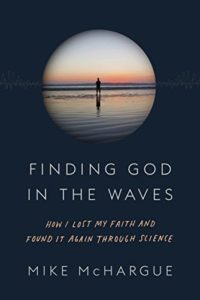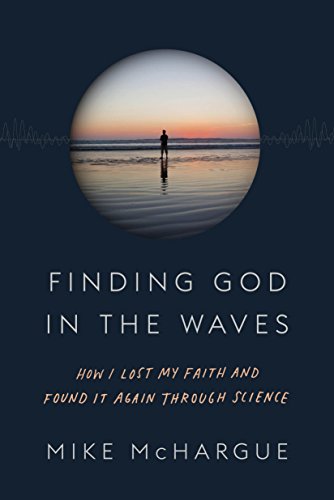
“What miracle is parting the sea in the face of a supernova? What power lies in an empty tomb when you compare it to nebulae that are hundreds of light-years in diameter, giving birth to stars?”
Mike McHargue, an author, speaker, and podcaster on science and religion, grappled with these questions as he struggled to reconcile the science he loved and the God he worshipped. His personal story, recounted in “Finding God in the Waves,” published in September by Convergent Books, incorporates his investigation of theology and science amid personal struggles. Though his first-person narrative grows wearisome at times, and though not everyone will agree with the religious tenets he puts forward, his authentic description of his doubts and his search for truth will ring true for many.
Though raised in a devout Southern Baptist family, McHargue began to explore theology more deeply when his parents’ divorce led him to reread the Bible in its entirety. In doing so, he discovers many conflicting passages and ideas about the creation of the world, society, and even love itself.
In his search for truth, which includes religious and secular sources, McHargue artfully incorporates the outside sources that impacted him, and gives a taste of the concepts and movements he moved toward and away from at different points in his journey, interweaving explanations of secular humanism and materialism with related anecdotes from his day-to-day life. His short accounts of various belief systems are surprisingly nuanced, skimming the surface of complex ideas without shortchanging them.
McHargue also distinguishes between his intellectual pursuit of God and his emotional experiences, and how both played into his changing view of religion and the Bible. Ultimately, McHargue classifies faith as an experience that cannot fully be articulated or processed rationally, though God’s presence resounds in the physical world.
“I was trying to see God as an equation to be solved instead of a living being who partners with us in His creation,” he said. “Somehow, life becomes more clear — and dear — when I refuse to water down one stance for the other and, instead, dive deeply into both streams of experience and feeling, collecting the truth that flows from each.”
After he voices his desire to return to the faith and reveals his doubts to those around him, McHargue recounts the process of reconstructing his faith as he undergoes a systematic review of the tenets of his former beliefs, reconsidering concepts like the incarnation of Christ and the trinitarian God with fresh perspective. McHargue does not attempt to settle all of these questions definitively, but by sharing his own thoughts, he invites readers to ponder the truth for themselves.
Even after he reaches the turning point in his search, he continues to depict his struggle to determine truth.
“Some days I feel that Jesus walks beside me, and other days I feel I’m completely bonkers for buying into the Resurrection,” he said.
Following his testimony of his path back to faith, McHargue assembles a sort of field guide to prayer, explaining its psychological effects and offering his own experiences and methods to those who may find themselves on a similar path. He even constructs axioms about God to serve as a starting point for rebuilding faith. For those readers with further questions, McHargue anticipates common responses and provides answers in the form of encounters with people who have corresponded with him or attended his talks. Consistent with his honest depiction of his own story, he shares tales of reconciliation but also the “church wounds” and heart-wrenching stories of unanswered prayers. His narrative pulls no punches, and faces tough existential questions head-on.
“No matter what kind of husband and father I am, no matter what I do, one day our Sun will swell into a red giant and destroy earth,” he said, struggling to find meaning in his then-godless world.
“There is no eternal significance to anything we do. This insight makes it hard for me to get out of bed in the morning or to enjoy life.”
Ultimately, McHargue finds peace in the idea the the opposite of faith is not doubt, but certainty.
“I doubt I’ll ever be able to resolve the contradiction between the indifferent universe I understand through science and the intimacy I find with God in prayer,” he said. “All I know is that even when I was working through existential doubts about God’s nature and character, prayer was the one place where God consistently met me.”

